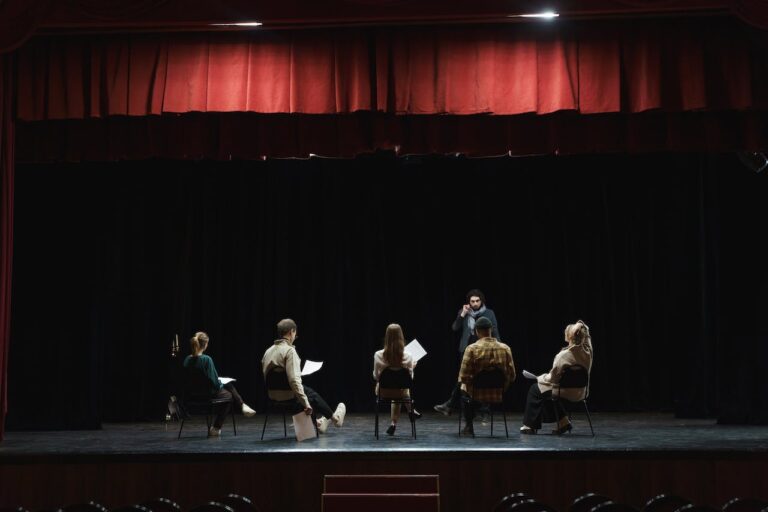Theatre Studies Extended Essay Topic Ideas for IB Students
Welcome, IB Students! As a seasoned writer and enthusiast in International Baccalaureate (IB) Theatre Studies, I’m excited to guide you in creating a standout Extended Essay on this fascinating subject.
IB Theatre Studies is not just about understanding plays; it’s a path into the heart of human expression and creativity. In my experience, the key to writing an outstanding paper is your passion for theater and how you articulate your insights and analysis.
Choosing Your Theatre Studies Extended Essay Topic
In my opinion, balancing your interests with the feasibility of research is key when choosing the best topic. Theatre is a vast field, covering everything from script analysis to stage design. Thus, pick a topic that truly resonates with you, making the research process more enjoyable and engaging. Below, we provide some ideas you can consider:

- The Evolution of Shakespearean Theatre. How has the evolution of Shakespearean theatre influenced modern theatrical practices and interpretations?
- Role of Stage Design in Modern Plays. In what ways does stage design contribute to the narrative and emotional impact of modern plays?
- Impact of Bertolt Brecht’s Epic Theatre. How has Bertolt Brecht’s concept of Epic Theatre impacted contemporary theatre, particularly in addressing social issues?
- Masks in Japanese Noh Theatre. What is the significance of mask usage in traditional Japanese Noh Theatre, and how does it contribute to the art form’s uniqueness?
- Development of Musical Theatre in the 20th Century. How has musical theatre evolved throughout the 20th century, and what factors have influenced its development?
- Greek Tragedy’s Influence on Modern Playwrights. In what ways have modern playwrights been influenced by the themes and structures of ancient Greek tragedies?
- Lighting Techniques in Contemporary Theatre. How do lighting techniques in contemporary theatre productions enhance mood and audience engagement?
- Gender Roles in Renaissance Theatre. How were gender roles represented in Renaissance theatre, and what implications did this have on society of that era?
- Technology’s Impact on Set Design in 21st Century Theatre. What impact has the advancement of technology had on set design in 21st-century theatre productions?
- Relevance of Stanislavski’s System in Modern Acting. How relevant is Stanislavski’s system in modern acting techniques and actor training?
- Cultural Significance of Indonesian Puppetry. How does Indonesian puppetry in theatre serve as a medium for cultural storytelling and preservation?
- Contributions of African American Playwrights. What contributions have African American playwrights made to contemporary American theatre, and how have their works addressed issues of race and identity?
- Role of Improvisation in Comedic Theatre. How do improvisation techniques contribute to the success and dynamics of comedic theatre?
- Socio-Political Themes in Arthur Miller’s Plays. How do the socio-political themes in Arthur Miller’s plays reflect and critique the society of his time?
- Theatre as an Educational Tool. What are the methods and impacts of using theatre as an educational tool in modern schooling?
- Contemporary Theatre’s Reflection of Social Issues. How does contemporary theatre address and reflect contemporary social issues?
- Influence of Costume Design on Characterization. How does costume design in theatre influence the portrayal and perception of characters?
- Music and Sound in Theatrical Performances. In what ways do music and sound enhance the narrative and emotional experience of theatrical performances?
- Theatre’s Role in Preserving Indigenous Cultures. How does theatre contribute to preserving and promoting indigenous cultures and languages?
- Contemporary Adaptations of Classical Plays. How do contemporary directors approach adapting classical plays for modern audiences, and what challenges do they face?
- The Psychological Impact of Method Acting on Performers. What are the psychological impacts of method acting on performers, and how do they manage these effects?
- Russian Theatre’s Influence on European Playwrights. How did Russian theatre influence the works of European playwrights in the 20th century?
- Multimedia in Expanding Theatrical Boundaries. How does the use of multimedia in theatre expand traditional boundaries and audience experiences?
- Site-Specific Theatre and Audience Engagement. How does the location of site-specific theatre influence the performance and audience engagement?
- Impact of Political Changes on 20th Century Theatre. How did political changes in the 20th century impact theatre productions, particularly regarding themes and censorship?
- Interpreting Shakespeare for Modern Audiences. What are the challenges and innovations in interpreting Shakespeare from a directorial perspective for modern audiences?
- Influence of Theatre Critics on Productions. How do theatre critics influence the creation and reception of theatre productions?
- Dynamic Between Playwright and Director. What is the dynamic between the playwright and the director in the creative process of theatre, and how does it affect the final production?
- Cultural Differences in Theatrical Productions. How do cultural differences impact theatrical productions and interpretations?
- Development of New Plays in Theatre Festivals. What role do theatre festivals play in developing and showcasing new plays?
- Choreography’s Role in Storytelling in Musicals. How does choreography contribute to storytelling and character development in musical theatre?
- Evolution of Children’s Theatre. What techniques have evolved in children’s theatre, and how do they impact young audiences?
- Theatre’s Reflection of Cultural Norms. How does theatre reflect and challenge contemporary cultural norms?
- Symbolism in Samuel Beckett’s Plays. How does Samuel Beckett utilize symbolism in his plays, and what meanings does it convey?
- Audience Interaction in Theatre. What forms does audience interaction take in contemporary theatre, and how does it affect the overall performance?
- Historical Accuracy in Period Plays. How important is historical accuracy in period plays, and what artistic liberties are commonly taken?
- Commedia dell’Arte’s Influence on Western Theatre. In what ways has the Italian Commedia dell’Arte influenced Western theatre, particularly in comedic styles?
- Theatre as a Tool for Social Change. How has theatre been used as a tool for social change, and what are some notable examples?
- Representation of LGBTQ+ Themes in Contemporary Theatre. How are LGBTQ+ themes portrayed in contemporary theatre, and how has this evolved over time?
- Use of Monologues in Theatre. What purposes do monologues serve in theatre, and what techniques are employed to make them effective?
- Origins and Influence of Absurdist Theatre. What are the origins of Absurdist Theatre, and how has it influenced modern playwriting?
- Portrayal of Mental Health in Theatre. How is mental health portrayed in contemporary theatre, and how do these portrayals compare across different cultures?
- Promotion of Experimental Theatre in Festivals. How do festivals contribute to the promotion and development of experimental theatre?
- Representation of Race and Ethnicity in Modern Theatre. How are race and ethnicity represented in modern theatre, and how do these representations impact societal perceptions?
- Elements of Tragicomedy in Modern Plays. What are the key aspects of tragicomedy in modern plays, and how do they contribute to the genre’s appeal?
- Strategies for Engaging Young Audiences in Theatre. What strategies effectively engage young audiences in theatre, and why are they important?
- Impact of Government Funding on Theatre Productions. How does government funding affect theatre productions, particularly content and creativity?
- Use of Silence in Theatre. How is silence used as a dramatic tool in theatre, and how does it affect audience perception?
- Intersection of Dance and Theatre in Physical Theatre. How do dance and theatre intersect in physical theatre, and what unique qualities does this bring to performances?
- Drama Therapy’s Role in Mental Health. How is drama therapy used in the context of mental health, and what benefits does it offer?
- Cultural Traditions and Theatrical Performance Styles. How do cultural traditions influence theatrical performance styles worldwide, and what are some key examples?
These EE topic ideas cover a wide range of areas in theatre studies, providing a variety of angles for Theatre Studies Extended Essay. Each option can be adapted and narrowed down to suit individual interests and research requirements.
You May Also Be Interested:
- How to Write a Theatre Studies Extended Essay
- How to Write a Visual Arts EE
- Good IB Visual Arts Extended Essay Topics
- Environmental Systems and Societies Extended Essay Topics
- Geography Extended Essay Topics
- Global Politics Extended Essay Topics
Analyzing Dramatic Texts and Theatrical Performances
When analyzing plays and performances, looking beyond the script is crucial. From my perspective, every element on stage — from lighting and set design to the actors’ delivery – plays a role in conveying the play’s message.
Consider the staging: how does the director’s choice of staging style (proscenium, thrust, arena, etc.) influence the audience’s experience? For instance, in my experience, a thrust stage can create a more intimate setting, allowing for a deeper connection between the actors and the audience.
Lighting is another critical aspect. It’s not just about visibility; it’s about mood and emphasis. Ask yourself, how does the lighting design reflect the play’s themes or highlight critical moments? I recall a production where the strategic use of spotlighting effectively isolated characters during crucial monologues, intensifying the emotional impact. This is the key to a successful extended essay.
Leave the stress to our expert writers and enjoy some downtime. Excellence is just a click away.Crush your IB goals with our extended essay writing service!

Acting styles also merit close attention. How do the actors’ choices in voice, movement, and interaction contribute to the overall narrative and themes of the play? For instance, using method acting can bring a sense of realism and authenticity to the characters, which, according to general IB criteria, is essential in analyzing character development and engagement.
In my opinion, the true art of analyzing theatre lies in appreciating how these diverse elements combine to create a cohesive and impactful experience. As you dig into your research and analysis, remember that theatre is a living, breathing art form. Its beauty lies in its complexity and ability to resonate with audiences on multiple levels. Your essay should capture this essence, demonstrating your understanding of the theatrical elements and appreciation for the art form.
Also, if you’re seeking practical tips on developing a strong thesis for your Music Extended Essay, our expert advice article is a must-read.
Conclusion
In conclusion, your Extended Essay in Theatre Studies is more than an academic requirement; it’s a way into the core of one of the most dynamic and expressive art forms. Take this opportunity to research, analyze, and express your unique perspective on theatre. I hope these insights and ideas will guide you in writing an academically sound and personally fulfilling paper. And if you need help, our experts at Buy IB Extended Essay Service are always there for you!

